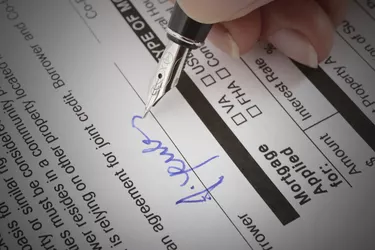
The federal government has insured mortgage loans for eligible borrowers for decades, including through the Federal Housing Administration. The FHA-insured mortgage loan programs are designed to make homeownership accessible to as many homebuyers as possible. FHA borrowers must meet certain minimum credit and income standards. Owing back taxes to the Internal Revenue Service may prevent an FHA mortgage applicant from receiving a loan, unless steps are taken to address the debt.
Back Taxes
Video of the Day
Tax liens show up on credit reports and make mortgage qualifying difficult. IRS tax liens make it especially hard to qualify for federally-backed loan programs, such as loans insured by the FHA. The best method for dealing with IRS back taxes, or liens, is to pay off the debt before applying for a loan. If you can't pay your back taxes in full, however, setting up a repayment plan may also work. If you have an IRS-approved repayment plan and have made 12 consecutive months of on-time payments, it's usually possible to apply for an FHA-backed mortgage.
Video of the Day
Making Installment Payments
An IRS tax lien is the federal government's legal claim against your property. The IRS does allow taxpayers who are behind in taxes to enter an installment agreement . Never miss your agreed-upon IRS installment payments, as that can jeopardize your ability to obtain an FHA-insured mortgage. As you're making the required on-time payments on your IRS debt, ensure that you're also prepared to meet the FHA's regular income, asset and debt requirements by speaking to an FHA-approved mortgage lender.
Applying for an FHA Mortgage
FHA mortgages offer more relaxed qualification standards for debt load, credit, and income than conventional loans. Be prepared to answer your FHA mortgage lender's questions about your IRS back taxes as well as your repayment plan. You usually must supply the lender with a copy of your IRS repayment plan and evidence of timely payments, such as cancelled checks, bank statements or automatic debit statements.
IRS Lien Subordination
IRS tax liens rank higher than mortgage liens in terms of payoff priority. Before approving applicants who have tax liens, lenders generally require that they get the IRS to agree to subordinate the lien. This means, the IRS agrees to get paid after the mortgage lender receives full repayment in a sale or refinance. If you've made timely, agreed-upon payments to the IRS, it may agree to subordinate its tax lien to a new mortgage lien. The IRS also provides complete online instructions and forms for applying for lien subordination.